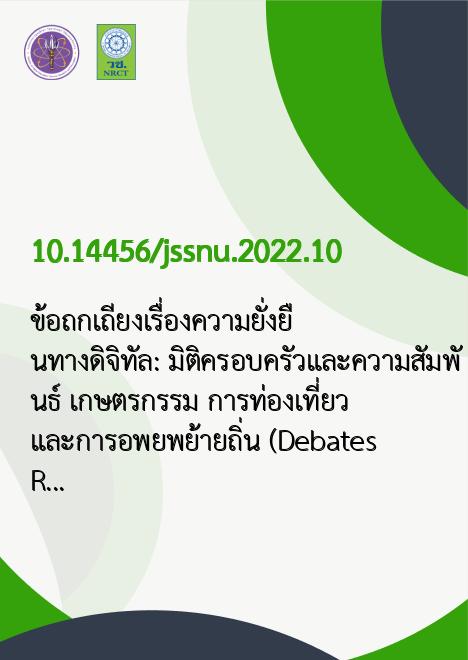
|
ข้อถกเถียงเรื่องความยั่งยืนทางดิจิทัล: มิติครอบครัวและความสัมพันธ์ เกษตรกรรม การท่องเที่ยว และการอพยพย้ายถิ่น (Debates Regarding Digital Sustainability: The Aspects of Family and Relationship, Agriculture, Tourism and Migration) |
|---|---|
| รหัสดีโอไอ | |
| Creator | ฐานิดา บุญวรรโณ |
| Title | ข้อถกเถียงเรื่องความยั่งยืนทางดิจิทัล: มิติครอบครัวและความสัมพันธ์ เกษตรกรรม การท่องเที่ยว และการอพยพย้ายถิ่น (Debates Regarding Digital Sustainability: The Aspects of Family and Relationship, Agriculture, Tourism and Migration) |
| Contributor | อัจฉริยา ชูวงศ์เลิศ,บุศรินทร์ เลิศชวลิตสกุล,กุลธิดา ศรีวิเชียร |
| Publisher | คณะสังคมศาสตร์ มหาวิทยาลัยนเรศวร |
| Publication Year | 2565 |
| Journal Title | วารสารสังคมศาสตร์ มหาวิทยาลัยนเรศวร |
| Journal Vol. | 18 |
| Journal No. | 2 |
| Page no. | 39-72 |
| Keyword | ความยั่งยืนทางดิจิทัล, วัฒนธรรมดิจิทัล, ครอบครัวและความสัมพันธ์, เกษตรกรรม, การท่องเที่ยว, การอพยพย้ายถิ่น, Digital Sustainability, Digital Culture, Family and Relationship, Agriculture, Tourism, Migration |
| URL Website | https://so04.tci-thaijo.org/index.php/jssnu |
| Website title | https://so04.tci-thaijo.org/index.php/jssnu/article/view/260308 |
| ISSN | 1686-9192 (Print), 2697-4657 (Online) |
| Abstract | บทความนี้มีเป้าหมายเพื่อนำเสนอข้อถกเถียงเรื่องความยั่งยืนทางดิจิทัลใน 4 มิติ ได้แก่ครอบครัวและความสัมพันธ์ เกษตรกรรม การท่องเที่ยว และการอพยพย้ายถิ่น โดยใช้วิธีการวิจัยเอกสารในการทบทวนองค์ความรู้จากการตั้งข้อถกเถียงดังกล่าว โดยพบประเด็นความยั่งยืนดิจิทัลในหลายมิติ ตั้งแต่ความยั่งยืนเชิงเทคนิคในการรักษาข้อมูลที่ทำให้เกิดการเข้าถึงและการใช้อย่างยั่งยืน การนำเอาเทคโนโลยีดิจิทัลมาใช้ให้เป็นประโยชน์ต่อการพัฒนา หรือให้การเปลี่ยนผ่านดิจิทัลเป็นส่วนหนึ่งของเป้าหมายการพัฒนาอย่างยั่งยืนในระดับโลก บทความนี้ใช้แนวคิดความยั่งยืนทางดิจิทัลมาทำความเข้าใจวัฒนธรรมดิจิทัลผ่าน 4 มิติดังกล่าว และเสนอข้อค้นพบดังนี้ ความยั่งยืนดิจิทัลในมิติครอบครัวและความสัมพันธ์คือนอกจากสื่อและเทคโนโลยีดิจิทัลได้ทำให้ความสัมพันธ์ของสมาชิกในครอบครัวยึดโยงกันแล้ว อีกด้านคือการสร้างระบบป้องกันหรือการรู้เท่าทันภัยคุกคามในโลกไซเบอร์ของเด็กหรือเยาวชน ส่วนด้านเกษตรกรรม แม้ว่าผู้ที่เกี่ยวข้องได้พยายามที่จะพัฒนาเกษตรกรรมในภาคการผลิตไปสู่เกษตรกรรมดิจิทัลอย่างต่อเนื่อง แต่โครงสร้างพื้นฐานทางด้านเครื่องมืออุปกรณ์และความรู้ด้านไอซีทีก็เป็นปัจจัยที่ก่อให้เกิดการเข้าถึงและใช้เทคโนโลยีอย่างเท่าเทียมและลดความเหลื่อมล้ำทางสังคม สอดคล้องกับมิติการท่องเที่ยวที่เทคโนโลยีดิจิทัลนำมาซึ่งการท่องเที่ยวอัจฉริยะและเปิดโอกาสให้ผู้กระทำการรายเล็กสามารถเข้าสู่การแข่งขัน แต่การสร้างความยั่งยืนคือการทำให้ระบบเศรษฐกิจนี้กลายเป็นพื้นที่ของการแบ่งปันและสร้างความรู้ตลอดจนประสบการณ์การท่องเที่ยวในมิติใหม่ ส่วนความยั่งยืนในการอพยพย้ายถิ่นคือการตั้งคำถามกับการใช้ศาสตร์ของข้อมูลในการจัดการและควบคุมการเคลื่อนย้ายของผู้คนที่ต้องคำนึงถึงหลักการใช้และเข้าถึงข้อมูล ตลอดจนเคารพต่อสิทธิมนุษยชนและความเป็นส่วนตัวThis paper aims to present debates regarding digital sustainability in four dimensions: family and relationship, agriculture, tourism, and migration for sustainable development on a global scale. This research adopted a documentary method to review the debates in diverse aspects, from technological sustainability in data preservation for the access and use of data to the adoption of digital technology for development encompassing the aims of 'digital transformation.' The research results from the reviews of the four main themes suggest that while digital media and technology have created bonding among family members, shielding young people from cybercrime and incorporating technological literacy are necessary for digital sustainability. The agricultural sector embraced and incorporated digital technology into their production systems. However, the infrastructure required to implement these tools and processes (including ICT skills) requires equal and unencumbered access to new technology to reduce social inequality. Sustainable digitalization involves the transformation of this sector into a shared repository of knowledge, data, and experiences, which accords with developing smart tourism campaigns on digital technology and creating broader opportunities for small-scale actors to participate in the market. Lastly, digital sustainability in migration must tackle the moral and ethical questions regarding using data science to manage and control migration. Authorities must consider the legal and moral principles associated with data collection in sensitive and political domains of access to data, respect for human rights, and privacy. |